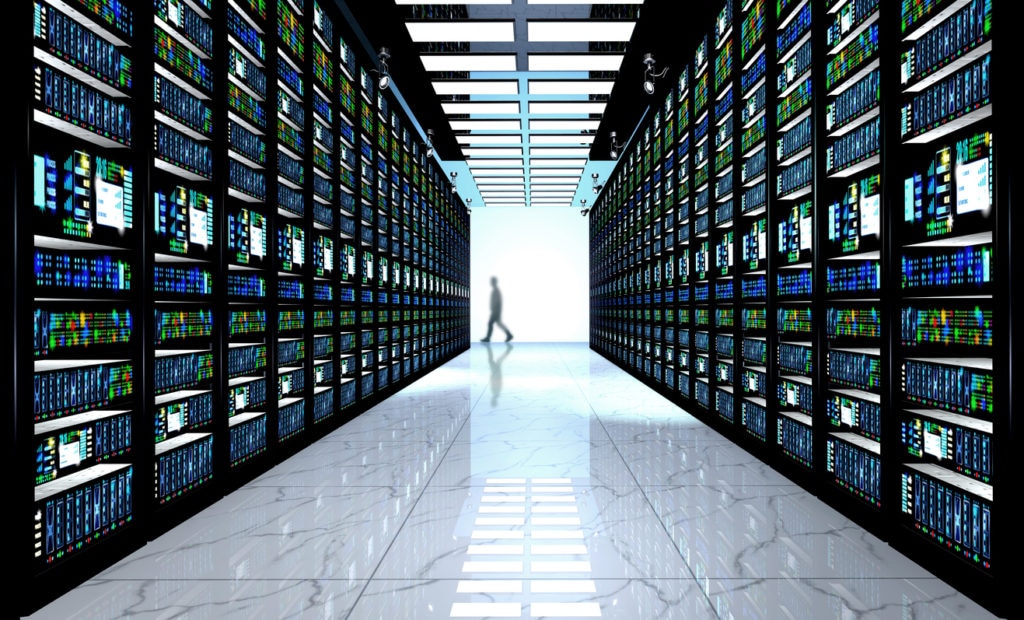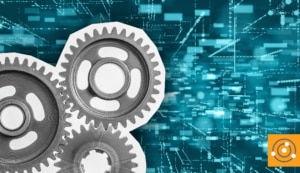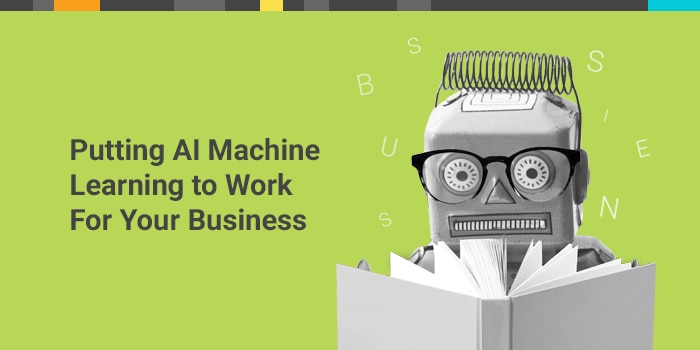Did you come here hoping to read a summary of the past 5+ years of my research on self-driving, autonomous vehicles, Tesla, and TNC businesses?
Well, you’re in luck… that’s my
next post.
This post helps make that post far more comprehensible. So here we lay the foundation, with fun, humor, and excitement. (Mild disclaimer for those who may have heard me speak on this topic before or listened to this story shared in talks and presentations. I hope you have fun all the same.)
I trust you’re all relatively smart and capable humans with a wide knowledge, depth, and breadth of the world, so for the following image, I want you to take a step back from your machine. In fact, I want you to look at it from as far as you possibly can, without putting a wall between you and the following image.

OK, have you looked at the image? Do you know what it is? If you're not sure, and perhaps have a child or aging grandparents, I encourage you to ask them.
Did you get hot dog? OK, cool. We’re all on the same page here.
Now as a mild disclaimer to my prior disclaimer—I’m familiar with the television series
Silicon Valley. I don’t watch it, but I know they had a similar use-case in that environment. This is not that story, but just as when I present on computer vision being used for active facial recognition by the
Chinese government to profile the Muslim minority in China and people say, "Oh, you mean like
Black Mirror..." I mean “like that,” but I mean it's real and not just "TV magic."
Last year in April (April 28, 2018), this innocuous meat enclosure was run through the paces on our top four favorite cloud and AI/ML platforms, giving us all deep insight into how machines work, how they think, and what kinds of things we like to eat for lunch on a random day—the 4th day of July, perhaps. These are our findings.
I think we can comfortably say Google is the leader in machine learning and artificial intelligence. You can disagree with that, but you'd likely be wrong. Consider one of the leading machine learning platforms Tensor Flow (TF), which is an open-source project by Google. TF was recently released in 2.0 as an Alpha, so you might think "Yeah, immature product is more like it." But when you peel back that onion a bit and realize Google has been using it internally for 20 years to power search and other internal products, you might feel it more appropriate to call it version 25.0, but I digress.

Image:
https://twitter.com/cloud_opinion/status/989691222590550016
As you can see, if we ask Google, "Hey, what does that look like to you?" it seems pretty spot on. It doesn't come right out and directly say, "that’s a hot dog," but we can't exactly argue with any of its findings. (I'll let you guys argue over eating hot dogs for breakfast.) So, we're in good hands. Google is invited to MY 4th of July party!
But seriously, who cares what Google thinks? Who even uses Google anyway? According to the
2018 cloud figures, Microsoft is actually the leader in cloud revenue, so I'm not likely to even use Google. Instead, I'm a Microsoft-y through and through. I bleed Azure! So, forget Google. I only care about what my platform of choice believes in, because that's what I'll be using.

Image:
https://twitter.com/cloud_opinion/status/989691222590550016
Let’s peel back the chopped white onion and dig into the tags a bit. Microsoft has us pegged pretty heavily with its confidences, and I can't say I agree more. With 0.95 confidence, Microsoft can unequivocally and definitively say, without a doubt, I am certain:
This is a carrot.
We're done here. We don't need to say any more on this matter. And to think we Americans are only weeks away from celebrating the 4th of July. So, throw some carrots on the BBQ and get ready, because I know how I'll be celebrating!
Perhaps that's too much hyperbole. It’s also 0.94 confident that it's "hot" (which brings me back to my Paris Hilton days, and I'm sure those are memories you've all worked so hard to block out). But... 0.66 gives us relative certainty that if it wasn't just a carrot, it's a carrot stick. I mean, obviously it's a nicely cut, shaved, and cleaned-off carrot stick. Throw it on the BBQ!
OK, but just as we couldn't figure out what color
“the dress” was, Microsoft knows what’s up, at 0.58 confidence. It's orange. Hey, it got something right. I mean, I figure if 0.58 were leveraged as a percentage instead of (1, 0, -1) it would be some kind of derivative of 0.42 and it would think it’s purple. (These are the jokes, people.)
But, if I leave you with nothing more than maybe, just MAYBE, if it's not a carrot and definitely NOT a carrot stick... it's probably bread, coming in at 0.41 confidence. (Which is cute and rings very true of
The Neural Net Dreams of Sheep. I'm sure the same is true of bread, too. Even the machines know we want carbs.)
But who really cares about Microsoft, anyway? I mean, I'm an AWS junkie, so I use Amazon as MY platform of choice. Amazon was the platform of choice of many
police departments to leverage its facial recognition technology to profile criminals, acts, and actions to do better policing and protect us better. (There are so many links on this kind of thing being used; picking just one was difficult. Feel free to read up on how police are trying to use this, and how some states and cities are trying to ban it.)
Obviously, Amazon is the only choice. But before we dig into that, I want to ask you a question. Do you like smoothies? I do. My favorite drink is the Açai Super Anti-Oxidant from Jamba Juice. So, I have a business opportunity for you here today.
Between you, me, and Amazon, I think we can build a business to put smoothie stores out of business, and we can do that through the power of robots, artificial intelligence, and machine learning powered by Amazon. Who's with me? Are you as excited as I am?
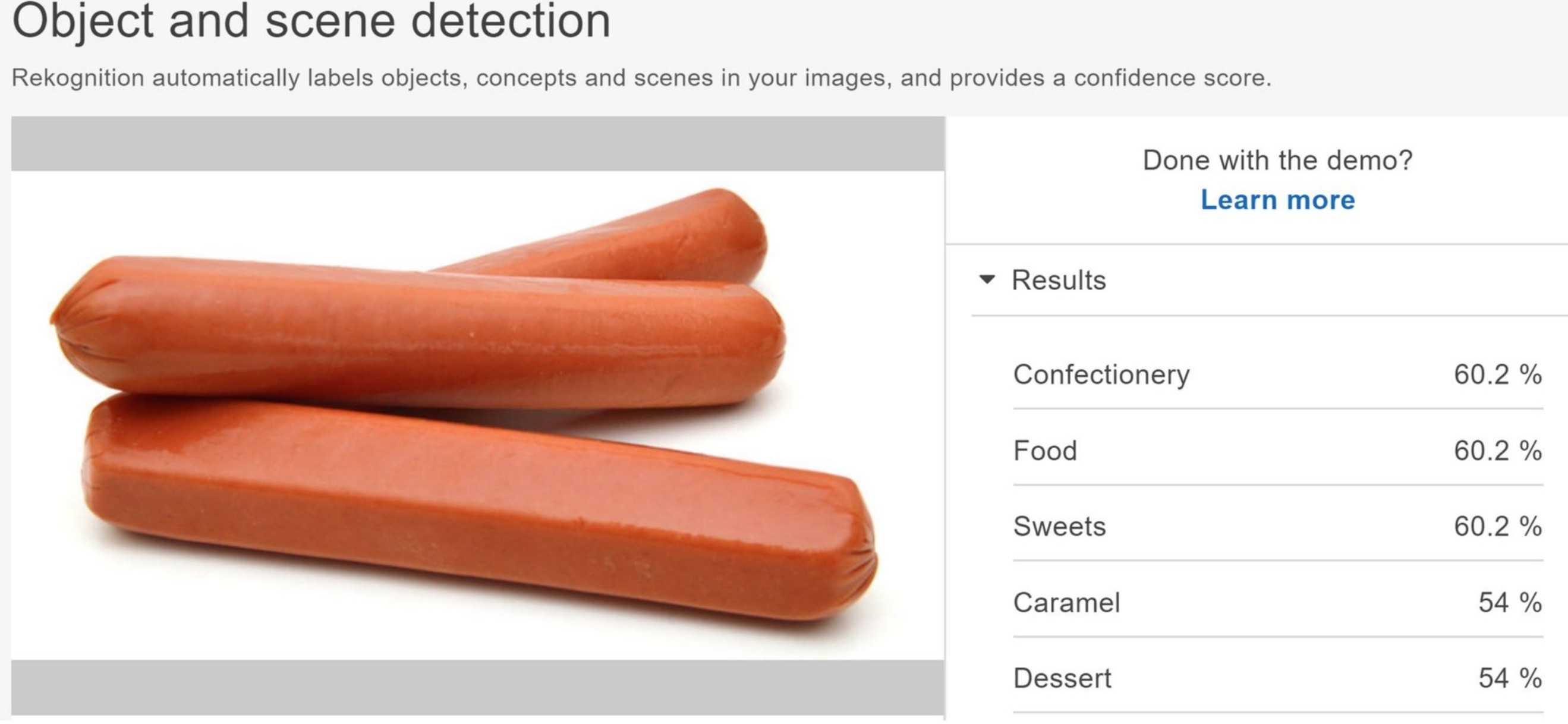 Image: https://twitter.com/cloud_opinion/status/989691222590550016
Image: https://twitter.com/cloud_opinion/status/989691222590550016
The first thing I'll order will be a sweet caramel dessert smoothie. It will be an amazing confectionery that will put your local smoothie shop out of business by the end of the week.
At this point, you might be asking yourself, "OK, this has been hilarious, but wasn't the topic something about businesses? Did you bury the lede?”
So, I'll often ask this question, usually of engineers: do businesses want machine learning? And they'll often say yes. But the truth is really, WE want machine learning, but businesses want machine knowledge.
It may not seem so important in the context of something silly like a hot dog, but, when applied at scale and in diverse situations, things can get very grave. The default dystopian future or “realistic” future I lean towards is plasma pumps in a hospital. Imagine a fully machine controlled and AI-leveraged device like a plasma pump. It picks out your blood type based on your chart or perhaps it pricks your finger, figures out what blood it should give you, and starts to administer it. Not an unrealistic future, to be honest. Now, what if it was accurate 99.99999% of the time? Pretty awesome, right? But let's say it was as accurate as Google was with a hot dog, at 98% confidence. A business can hardly accept the liability that 99.9999999% might give. Drop that down to 98%, or the more realistic 90-95%, and that is literal deaths on our hands.
Yes, businesses don't really want machine learning. They say they do because it's popular and buzzword-y, but when lives are potentially on the line, tiny mistakes come with a cost. And those mistakes add up, which can affect the confidence the market can tolerate. But hey, how much IS a life really worth? If you can give up your life to make a device, system, or
database run by machine learning/AI better for the next person, versus, oh I don't know, maybe training your models better and a little longer—is it worth it?
There will come a point or many points where there are acceptable tolerances, and we'll see those tolerances and accept them for what they are at a certain point because, "It doesn't affect me. That's someone else's problem." Frankly, the accuracy of machine learning has skyrocketed in the past few years alone. That compounded with better, faster, smarter, and smaller TPUs (tensor processing units) means we truly are in a next-generation era in the kinds of things we can do.
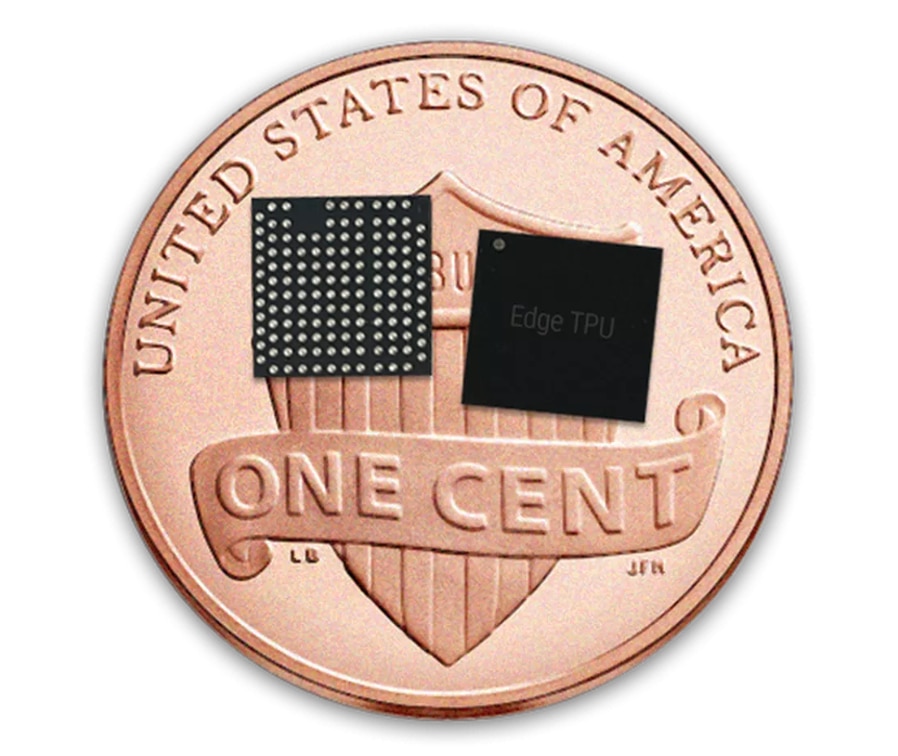
Image:
Google unveils tiny new AI chips for on-device machine learning - The Verge
Yes, indeed, the future will be here before we know it. But mistakes can come with dire costs, and business mistakes will cost in so many more ways because we "trust" businesses to do the better or the right thing.
"Ooh, ooh! You said four cloud providers. Where's IBM Watson?"
Yes, you're right. I wasn't going to forget IBM Watson. After all, they're the businessman's business cloud. No one ever got fired for buying IBM, blah blah blah, so on and so forth.
I always include this for good measure. No, not because it’s better than Google, Microsoft, or Amazon, but because of how funny it is.
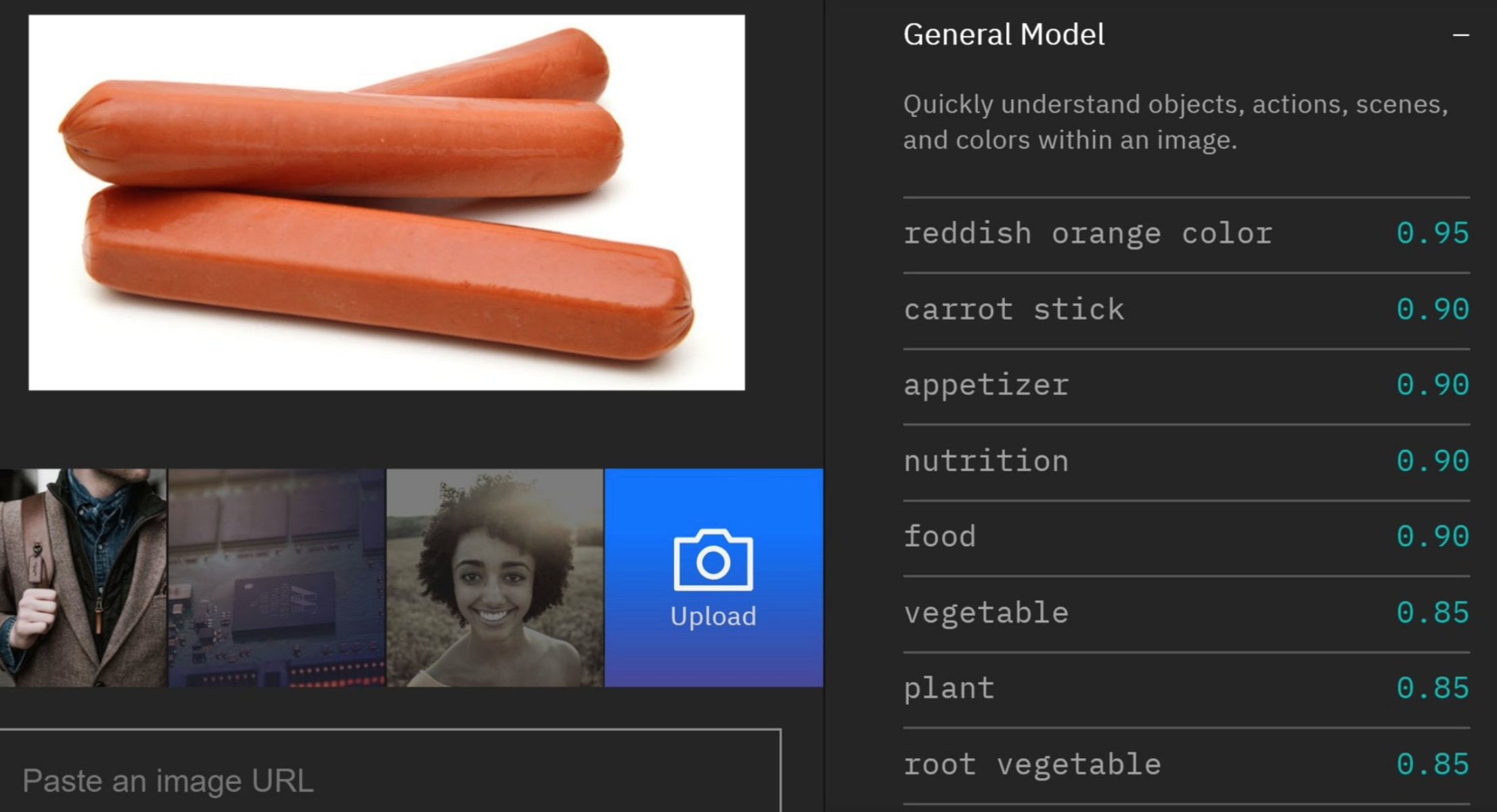
Image:
https://twitter.com/cloud_opinion/status/989762287819935744
I’ll give IBM one thing—they're confident in the color of a hot dog, and really, what more can we ask for?
Hopefully, this was helpful, informative, and funny (I was really angling on funny). But seriously, you should have a better foundation for the constantly “learning” nature of the technology we work with. Consider that machines have a large
knowledge base of information, and what they can learn in such a short time to make determinations about what a particular object is. Then also consider if you have young children. Send them into the kitchen and say, "Bring me a hot dog," and you're far more likely to get a hot dog back than you are to get a carrot stick (or a sweet caramel dessert). The point being, the machines that learn and the "artificial" intelligence we expect them to work with and operate from have the approximate intelligence of a 2- or 3-year-old.
They will get better, especially as we throw more resources at them (models, power, TPUs, CPU, and so forth) but they're not there yet. If you liked this, you'll equally enjoy the next article (or be terrified when we get to the actual subject matter).
Are you excited? I know I am. It's a nice day here in Portland, so I'm going to go enjoy a nice hot dog smoothie.
 OK, have you looked at the image? Do you know what it is? If you're not sure, and perhaps have a child or aging grandparents, I encourage you to ask them.
Did you get hot dog? OK, cool. We’re all on the same page here.
Now as a mild disclaimer to my prior disclaimer—I’m familiar with the television series Silicon Valley. I don’t watch it, but I know they had a similar use-case in that environment. This is not that story, but just as when I present on computer vision being used for active facial recognition by the Chinese government to profile the Muslim minority in China and people say, "Oh, you mean like Black Mirror..." I mean “like that,” but I mean it's real and not just "TV magic."
Last year in April (April 28, 2018), this innocuous meat enclosure was run through the paces on our top four favorite cloud and AI/ML platforms, giving us all deep insight into how machines work, how they think, and what kinds of things we like to eat for lunch on a random day—the 4th day of July, perhaps. These are our findings.
I think we can comfortably say Google is the leader in machine learning and artificial intelligence. You can disagree with that, but you'd likely be wrong. Consider one of the leading machine learning platforms Tensor Flow (TF), which is an open-source project by Google. TF was recently released in 2.0 as an Alpha, so you might think "Yeah, immature product is more like it." But when you peel back that onion a bit and realize Google has been using it internally for 20 years to power search and other internal products, you might feel it more appropriate to call it version 25.0, but I digress.
OK, have you looked at the image? Do you know what it is? If you're not sure, and perhaps have a child or aging grandparents, I encourage you to ask them.
Did you get hot dog? OK, cool. We’re all on the same page here.
Now as a mild disclaimer to my prior disclaimer—I’m familiar with the television series Silicon Valley. I don’t watch it, but I know they had a similar use-case in that environment. This is not that story, but just as when I present on computer vision being used for active facial recognition by the Chinese government to profile the Muslim minority in China and people say, "Oh, you mean like Black Mirror..." I mean “like that,” but I mean it's real and not just "TV magic."
Last year in April (April 28, 2018), this innocuous meat enclosure was run through the paces on our top four favorite cloud and AI/ML platforms, giving us all deep insight into how machines work, how they think, and what kinds of things we like to eat for lunch on a random day—the 4th day of July, perhaps. These are our findings.
I think we can comfortably say Google is the leader in machine learning and artificial intelligence. You can disagree with that, but you'd likely be wrong. Consider one of the leading machine learning platforms Tensor Flow (TF), which is an open-source project by Google. TF was recently released in 2.0 as an Alpha, so you might think "Yeah, immature product is more like it." But when you peel back that onion a bit and realize Google has been using it internally for 20 years to power search and other internal products, you might feel it more appropriate to call it version 25.0, but I digress.
 Image: https://twitter.com/cloud_opinion/status/989691222590550016
As you can see, if we ask Google, "Hey, what does that look like to you?" it seems pretty spot on. It doesn't come right out and directly say, "that’s a hot dog," but we can't exactly argue with any of its findings. (I'll let you guys argue over eating hot dogs for breakfast.) So, we're in good hands. Google is invited to MY 4th of July party!
But seriously, who cares what Google thinks? Who even uses Google anyway? According to the 2018 cloud figures, Microsoft is actually the leader in cloud revenue, so I'm not likely to even use Google. Instead, I'm a Microsoft-y through and through. I bleed Azure! So, forget Google. I only care about what my platform of choice believes in, because that's what I'll be using.
Image: https://twitter.com/cloud_opinion/status/989691222590550016
As you can see, if we ask Google, "Hey, what does that look like to you?" it seems pretty spot on. It doesn't come right out and directly say, "that’s a hot dog," but we can't exactly argue with any of its findings. (I'll let you guys argue over eating hot dogs for breakfast.) So, we're in good hands. Google is invited to MY 4th of July party!
But seriously, who cares what Google thinks? Who even uses Google anyway? According to the 2018 cloud figures, Microsoft is actually the leader in cloud revenue, so I'm not likely to even use Google. Instead, I'm a Microsoft-y through and through. I bleed Azure! So, forget Google. I only care about what my platform of choice believes in, because that's what I'll be using.
 Image: https://twitter.com/cloud_opinion/status/989691222590550016
Let’s peel back the chopped white onion and dig into the tags a bit. Microsoft has us pegged pretty heavily with its confidences, and I can't say I agree more. With 0.95 confidence, Microsoft can unequivocally and definitively say, without a doubt, I am certain:
This is a carrot.
We're done here. We don't need to say any more on this matter. And to think we Americans are only weeks away from celebrating the 4th of July. So, throw some carrots on the BBQ and get ready, because I know how I'll be celebrating!
Perhaps that's too much hyperbole. It’s also 0.94 confident that it's "hot" (which brings me back to my Paris Hilton days, and I'm sure those are memories you've all worked so hard to block out). But... 0.66 gives us relative certainty that if it wasn't just a carrot, it's a carrot stick. I mean, obviously it's a nicely cut, shaved, and cleaned-off carrot stick. Throw it on the BBQ!
OK, but just as we couldn't figure out what color “the dress” was, Microsoft knows what’s up, at 0.58 confidence. It's orange. Hey, it got something right. I mean, I figure if 0.58 were leveraged as a percentage instead of (1, 0, -1) it would be some kind of derivative of 0.42 and it would think it’s purple. (These are the jokes, people.)
But, if I leave you with nothing more than maybe, just MAYBE, if it's not a carrot and definitely NOT a carrot stick... it's probably bread, coming in at 0.41 confidence. (Which is cute and rings very true of The Neural Net Dreams of Sheep. I'm sure the same is true of bread, too. Even the machines know we want carbs.)
But who really cares about Microsoft, anyway? I mean, I'm an AWS junkie, so I use Amazon as MY platform of choice. Amazon was the platform of choice of many police departments to leverage its facial recognition technology to profile criminals, acts, and actions to do better policing and protect us better. (There are so many links on this kind of thing being used; picking just one was difficult. Feel free to read up on how police are trying to use this, and how some states and cities are trying to ban it.)
Obviously, Amazon is the only choice. But before we dig into that, I want to ask you a question. Do you like smoothies? I do. My favorite drink is the Açai Super Anti-Oxidant from Jamba Juice. So, I have a business opportunity for you here today.
Between you, me, and Amazon, I think we can build a business to put smoothie stores out of business, and we can do that through the power of robots, artificial intelligence, and machine learning powered by Amazon. Who's with me? Are you as excited as I am?
Image: https://twitter.com/cloud_opinion/status/989691222590550016
Let’s peel back the chopped white onion and dig into the tags a bit. Microsoft has us pegged pretty heavily with its confidences, and I can't say I agree more. With 0.95 confidence, Microsoft can unequivocally and definitively say, without a doubt, I am certain:
This is a carrot.
We're done here. We don't need to say any more on this matter. And to think we Americans are only weeks away from celebrating the 4th of July. So, throw some carrots on the BBQ and get ready, because I know how I'll be celebrating!
Perhaps that's too much hyperbole. It’s also 0.94 confident that it's "hot" (which brings me back to my Paris Hilton days, and I'm sure those are memories you've all worked so hard to block out). But... 0.66 gives us relative certainty that if it wasn't just a carrot, it's a carrot stick. I mean, obviously it's a nicely cut, shaved, and cleaned-off carrot stick. Throw it on the BBQ!
OK, but just as we couldn't figure out what color “the dress” was, Microsoft knows what’s up, at 0.58 confidence. It's orange. Hey, it got something right. I mean, I figure if 0.58 were leveraged as a percentage instead of (1, 0, -1) it would be some kind of derivative of 0.42 and it would think it’s purple. (These are the jokes, people.)
But, if I leave you with nothing more than maybe, just MAYBE, if it's not a carrot and definitely NOT a carrot stick... it's probably bread, coming in at 0.41 confidence. (Which is cute and rings very true of The Neural Net Dreams of Sheep. I'm sure the same is true of bread, too. Even the machines know we want carbs.)
But who really cares about Microsoft, anyway? I mean, I'm an AWS junkie, so I use Amazon as MY platform of choice. Amazon was the platform of choice of many police departments to leverage its facial recognition technology to profile criminals, acts, and actions to do better policing and protect us better. (There are so many links on this kind of thing being used; picking just one was difficult. Feel free to read up on how police are trying to use this, and how some states and cities are trying to ban it.)
Obviously, Amazon is the only choice. But before we dig into that, I want to ask you a question. Do you like smoothies? I do. My favorite drink is the Açai Super Anti-Oxidant from Jamba Juice. So, I have a business opportunity for you here today.
Between you, me, and Amazon, I think we can build a business to put smoothie stores out of business, and we can do that through the power of robots, artificial intelligence, and machine learning powered by Amazon. Who's with me? Are you as excited as I am?
 Image: https://twitter.com/cloud_opinion/status/989691222590550016
The first thing I'll order will be a sweet caramel dessert smoothie. It will be an amazing confectionery that will put your local smoothie shop out of business by the end of the week.
At this point, you might be asking yourself, "OK, this has been hilarious, but wasn't the topic something about businesses? Did you bury the lede?”
So, I'll often ask this question, usually of engineers: do businesses want machine learning? And they'll often say yes. But the truth is really, WE want machine learning, but businesses want machine knowledge.
It may not seem so important in the context of something silly like a hot dog, but, when applied at scale and in diverse situations, things can get very grave. The default dystopian future or “realistic” future I lean towards is plasma pumps in a hospital. Imagine a fully machine controlled and AI-leveraged device like a plasma pump. It picks out your blood type based on your chart or perhaps it pricks your finger, figures out what blood it should give you, and starts to administer it. Not an unrealistic future, to be honest. Now, what if it was accurate 99.99999% of the time? Pretty awesome, right? But let's say it was as accurate as Google was with a hot dog, at 98% confidence. A business can hardly accept the liability that 99.9999999% might give. Drop that down to 98%, or the more realistic 90-95%, and that is literal deaths on our hands.
Yes, businesses don't really want machine learning. They say they do because it's popular and buzzword-y, but when lives are potentially on the line, tiny mistakes come with a cost. And those mistakes add up, which can affect the confidence the market can tolerate. But hey, how much IS a life really worth? If you can give up your life to make a device, system, or database run by machine learning/AI better for the next person, versus, oh I don't know, maybe training your models better and a little longer—is it worth it?
There will come a point or many points where there are acceptable tolerances, and we'll see those tolerances and accept them for what they are at a certain point because, "It doesn't affect me. That's someone else's problem." Frankly, the accuracy of machine learning has skyrocketed in the past few years alone. That compounded with better, faster, smarter, and smaller TPUs (tensor processing units) means we truly are in a next-generation era in the kinds of things we can do.
Image: https://twitter.com/cloud_opinion/status/989691222590550016
The first thing I'll order will be a sweet caramel dessert smoothie. It will be an amazing confectionery that will put your local smoothie shop out of business by the end of the week.
At this point, you might be asking yourself, "OK, this has been hilarious, but wasn't the topic something about businesses? Did you bury the lede?”
So, I'll often ask this question, usually of engineers: do businesses want machine learning? And they'll often say yes. But the truth is really, WE want machine learning, but businesses want machine knowledge.
It may not seem so important in the context of something silly like a hot dog, but, when applied at scale and in diverse situations, things can get very grave. The default dystopian future or “realistic” future I lean towards is plasma pumps in a hospital. Imagine a fully machine controlled and AI-leveraged device like a plasma pump. It picks out your blood type based on your chart or perhaps it pricks your finger, figures out what blood it should give you, and starts to administer it. Not an unrealistic future, to be honest. Now, what if it was accurate 99.99999% of the time? Pretty awesome, right? But let's say it was as accurate as Google was with a hot dog, at 98% confidence. A business can hardly accept the liability that 99.9999999% might give. Drop that down to 98%, or the more realistic 90-95%, and that is literal deaths on our hands.
Yes, businesses don't really want machine learning. They say they do because it's popular and buzzword-y, but when lives are potentially on the line, tiny mistakes come with a cost. And those mistakes add up, which can affect the confidence the market can tolerate. But hey, how much IS a life really worth? If you can give up your life to make a device, system, or database run by machine learning/AI better for the next person, versus, oh I don't know, maybe training your models better and a little longer—is it worth it?
There will come a point or many points where there are acceptable tolerances, and we'll see those tolerances and accept them for what they are at a certain point because, "It doesn't affect me. That's someone else's problem." Frankly, the accuracy of machine learning has skyrocketed in the past few years alone. That compounded with better, faster, smarter, and smaller TPUs (tensor processing units) means we truly are in a next-generation era in the kinds of things we can do.
 Image: Google unveils tiny new AI chips for on-device machine learning - The Verge
Yes, indeed, the future will be here before we know it. But mistakes can come with dire costs, and business mistakes will cost in so many more ways because we "trust" businesses to do the better or the right thing.
"Ooh, ooh! You said four cloud providers. Where's IBM Watson?"
Yes, you're right. I wasn't going to forget IBM Watson. After all, they're the businessman's business cloud. No one ever got fired for buying IBM, blah blah blah, so on and so forth.
I always include this for good measure. No, not because it’s better than Google, Microsoft, or Amazon, but because of how funny it is.
Image: Google unveils tiny new AI chips for on-device machine learning - The Verge
Yes, indeed, the future will be here before we know it. But mistakes can come with dire costs, and business mistakes will cost in so many more ways because we "trust" businesses to do the better or the right thing.
"Ooh, ooh! You said four cloud providers. Where's IBM Watson?"
Yes, you're right. I wasn't going to forget IBM Watson. After all, they're the businessman's business cloud. No one ever got fired for buying IBM, blah blah blah, so on and so forth.
I always include this for good measure. No, not because it’s better than Google, Microsoft, or Amazon, but because of how funny it is.
 Image: https://twitter.com/cloud_opinion/status/989762287819935744
I’ll give IBM one thing—they're confident in the color of a hot dog, and really, what more can we ask for?
Hopefully, this was helpful, informative, and funny (I was really angling on funny). But seriously, you should have a better foundation for the constantly “learning” nature of the technology we work with. Consider that machines have a large knowledge base of information, and what they can learn in such a short time to make determinations about what a particular object is. Then also consider if you have young children. Send them into the kitchen and say, "Bring me a hot dog," and you're far more likely to get a hot dog back than you are to get a carrot stick (or a sweet caramel dessert). The point being, the machines that learn and the "artificial" intelligence we expect them to work with and operate from have the approximate intelligence of a 2- or 3-year-old.
They will get better, especially as we throw more resources at them (models, power, TPUs, CPU, and so forth) but they're not there yet. If you liked this, you'll equally enjoy the next article (or be terrified when we get to the actual subject matter).
Are you excited? I know I am. It's a nice day here in Portland, so I'm going to go enjoy a nice hot dog smoothie.
Image: https://twitter.com/cloud_opinion/status/989762287819935744
I’ll give IBM one thing—they're confident in the color of a hot dog, and really, what more can we ask for?
Hopefully, this was helpful, informative, and funny (I was really angling on funny). But seriously, you should have a better foundation for the constantly “learning” nature of the technology we work with. Consider that machines have a large knowledge base of information, and what they can learn in such a short time to make determinations about what a particular object is. Then also consider if you have young children. Send them into the kitchen and say, "Bring me a hot dog," and you're far more likely to get a hot dog back than you are to get a carrot stick (or a sweet caramel dessert). The point being, the machines that learn and the "artificial" intelligence we expect them to work with and operate from have the approximate intelligence of a 2- or 3-year-old.
They will get better, especially as we throw more resources at them (models, power, TPUs, CPU, and so forth) but they're not there yet. If you liked this, you'll equally enjoy the next article (or be terrified when we get to the actual subject matter).
Are you excited? I know I am. It's a nice day here in Portland, so I'm going to go enjoy a nice hot dog smoothie. 
